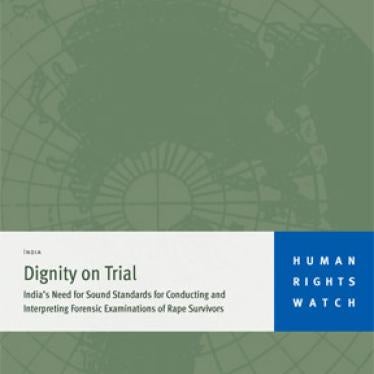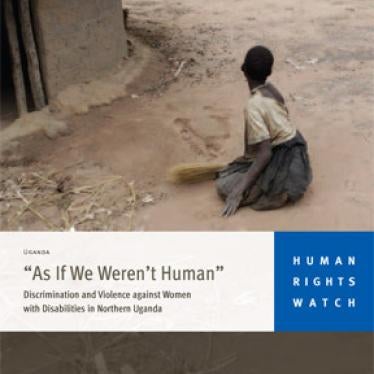(New York) - Congressional leaders should ensure passage this session of a bipartisan bill that sets out a new US strategy for ending violence against women worldwide, Human Rights Watch said today. The bill was approved on December 14, 2010, by the Senate Foreign Relations Committee.
The draft International Violence Against Women Act (IVAWA) would require the State Department to adopt a five-year plan to reduce violence against women in up to 20 target countries. The approach calls for increased legal and judicial protection for women, strengthened health services to respond to violence, increased educational and economic opportunities for women, and efforts to change social norms that perpetuate violence against women. Special attention would be given to responding to violence against women during humanitarian disasters and armed conflict.
"The Foreign Relations Committee vote offers the full Senate a smart, bipartisan bill that would strike back against the worldwide epidemic of violence against women," said Meghan Rhoad, women's rights researcher at Human Rights Watch. "This Congress has a chance to make a difference in the lives of millions of women and girls, and shouldn't waste it."
The bill would complement the Violence Against Women Act, which addresses these issues within the United States. Similar legislation was introduced, but not voted on, in the last Congress.
The United Nations estimates that one of every three women in the world has been a victim of violence. Human Rights Watch reports have documented rampant violence against women, both in armed conflicts and in homes and workplaces throughout the world. Much of the violence goes unpunished, especially where insufficient legal protections are compounded by poor enforcement. Recent Human Rights Watch investigations exposed degrading forensic examinations conducted on rape survivors by medical personnel in India and the frequent abuse of women with disabilities in northern Uganda.
"Human Rights Watch's research around the world shows how violence against women undermines their ability to participate as equals in all aspects of society, from education and employment to politics," Rhoad said. "The proposed US law is a powerful initiative to combat violence against women and is now within reach."
Human Rights Watch noted the mounting evidence of the debilitating effect of violence against women on economic development. In some countries, violence and sexual harassment in schools prevent women from getting an education and contributing fully to their communities. The health care costs and workplace absenteeism associated with injuries from domestic violence also take a significant financial toll.
The Senate bill has 35 cosponsors. Lead sponsors are John Kerry, Democrat of Massachusetts; Barbara Boxer, Democrat of California; and Olympia Snowe and Susan Collins, Republicans of Maine. The House of Representatives version, which has been referred to the Committee on Foreign Affairs and the Committee on Armed Services, has 133 cosponsors. Lead sponsors are Bill Delahunt, Democrat of Massachusetts; Ted Poe, Republican of Texas; and Jan Schakowsky, Democrat of Illinois. Complete lists of the bills co-sponsors are available here: http://thomas.loc.gov/cgi-bin/bdquery/z?d111:S.2982:@@@P (Senate) and http://thomas.loc.gov/cgi-bin/bdquery/z?d111:H.R.4594:@@@P (House).
Human Rights Watch repeated its call for the US Senate to ratify the Convention on the Elimination of All Forms of Discrimination against Women. The US is only one of seven countries in the world not to have ratified the major global women's rights treaty.








